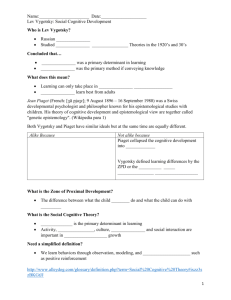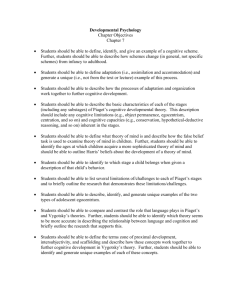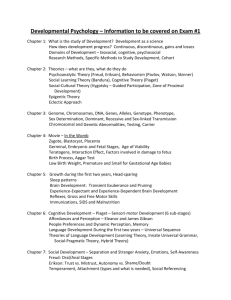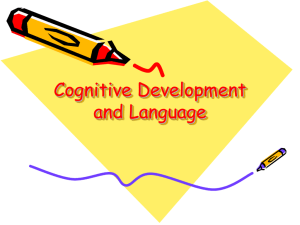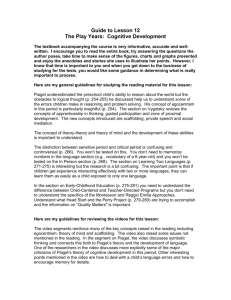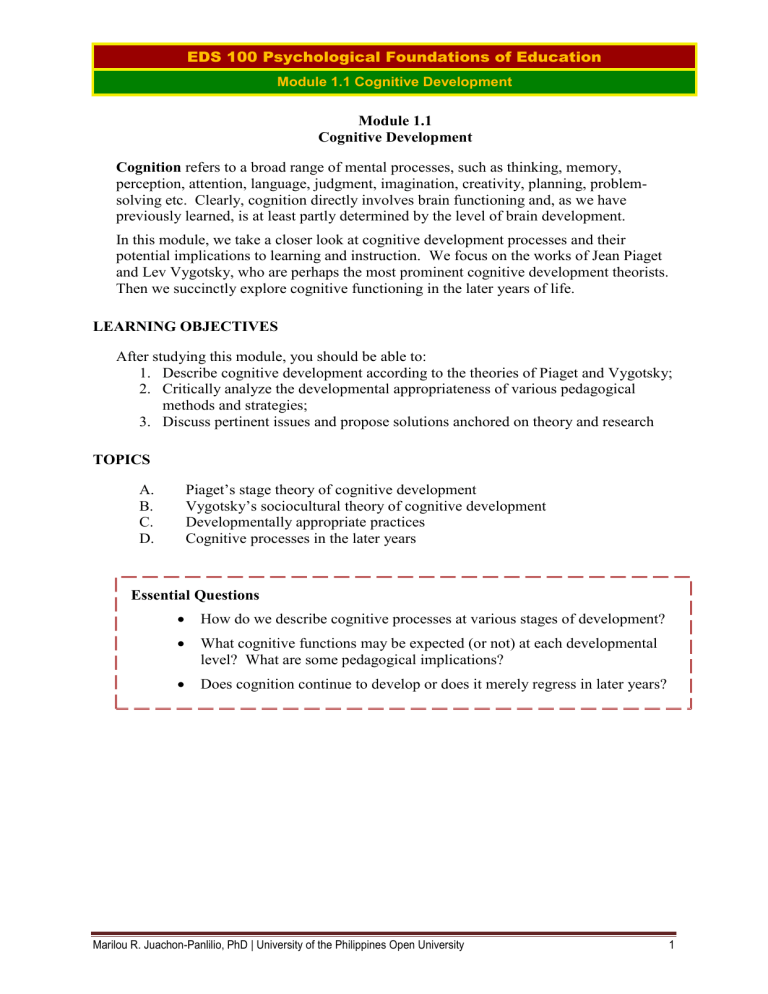
EDS 100 Psychological Foundations of Education Module 1.1 Cognitive Development Module 1.1 Cognitive Development Cognition refers to a broad range of mental processes, such as thinking, memory, perception, attention, language, judgment, imagination, creativity, planning, problemsolving etc. Clearly, cognition directly involves brain functioning and, as we have previously learned, is at least partly determined by the level of brain development. In this module, we take a closer look at cognitive development processes and their potential implications to learning and instruction. We focus on the works of Jean Piaget and Lev Vygotsky, who are perhaps the most prominent cognitive development theorists. Then we succinctly explore cognitive functioning in the later years of life. LEARNING OBJECTIVES After studying this module, you should be able to: 1. Describe cognitive development according to the theories of Piaget and Vygotsky; 2. Critically analyze the developmental appropriateness of various pedagogical methods and strategies; 3. Discuss pertinent issues and propose solutions anchored on theory and research TOPICS Piaget’s stage theory of cognitive development Vygotsky’s sociocultural theory of cognitive development Developmentally appropriate practices Cognitive processes in the later years A. B. C. D. Essential Questions How do we describe cognitive processes at various stages of development? What cognitive functions may be expected (or not) at each developmental level? What are some pedagogical implications? Does cognition continue to develop or does it merely regress in later years? Marilou R. Juachon-Panlilio, PhD | University of the Philippines Open University 1 EDS 100 Psychological Foundations of Education Module 1.1 Cognitive Development A. VYGOTSKY’S SOCIOCULTURAL THEORY OF COGNITIVE DEVELOPMENT Lev Vygotsky’s theory emphasized the roles of social interactions and culture in cognitive development. Learning precedes (paves the ways for) development. Important ideas to look up: Culture, cultural tools Mental functions (elementary; higher) Language (social, private, inner speech) and cognition Zone of proximal development (ZPD) More knowledgeable other (MKO); scaffolding Let’s learn! Lev Vygotsky (S. McLeod, 2018) Describes Vygotsky’s social-cognitive theory of development and compares it with Piaget’s stage theory of cognitive development OR VIDEO OPTIONS Vygotsky sociocultural development (khanacademy, 2014; 9:55 min) OR Vygotsky's Developmental Theory: An Introduction (Davidson Films, Inc., 2010; 4 min) B. PIAGET’S STAGE THEORY OF COGNITIVE DEVELOPMENT Jean Piaget is considered as one of the most dominant cognitive development theorists. He systematically studied how thinking progressed with age and proposed that cognition developed through four distinct stages: sensorimotor, preoperational, concrete operations, and formal operations. Piaget argues that cognitive development is a In contrast to Vygotsky’s argument consequence of interactions between biological that learning precedes maturation and the environment. Both maturation and development, Piaget posits that cognitive development proceed through an invariant development precedes learning. sequence of stages. Accordingly, and in contrast to Vygotsky’s argument that learning precedes development, Piaget posits that development precedes (a precondition for) learning. Warm-up (Overview) The articles below provide us with a quick review of Piaget’s theory—the key concepts and stages. Choose at least one: The 4 Stages of Cognitive Development: Background and Key Concepts of Piaget's Theory (K. Cherry, 2019) Links to articles that elaborate on specific topics are provided Marilou R. Juachon-Panlilio, PhD | University of the Philippines Open University 2 EDS 100 Psychological Foundations of Education Module 1.1 Cognitive Development OR Jean Piaget’s Theory Of Cognitive Development (S. McLeod, 2018) o Embedded video: Development: Schemas, Assimilation, & Accommodation (ByPass Publishing, 2013. [1:44 min]) - explains what "schemas" are, and how they relate to cognitive processes such as assimilation and accommodation o Follow the links for elaboration on the following topics: Sensorimotor Stage Object Permanence Preoperational Stage Concrete Operational Stage Formal Operational Stage OR Cognitive Development: The Theory of Jean Piaget (Lumen Learning. Educational Psychology) OR - VIDEO OPTION Piaget's stages of cognitive development (KhanAcademy, 2013) [5:15 min] LEARNING ACTIVITIES (Piaget) 1. Important concepts to look up and understand: Schema Equilibrium; assimilation; accommodation Object permanence Transitivity; [ir]reversibility Conservation Egocentricity Operational thought (pre-operational; concrete operational; formal operational) Deductive reasoning; inductive reasoning 2. Complete the table. As you study the resources, complete the table accordingly. Include in the table as many of the concepts above as you can. Modify the table to best suit your learning needs and style. Age range Stage/ Characterisitics ___ years Sensorimotor Experiences the world through senses and actions, e.g.: _[etc]__ Pre-operational... [etc] Marilou R. Juachon-Panlilio, PhD | University of the Philippines Open University Developmental Milestones Object permanence Etc___ 3 EDS 100 Psychological Foundations of Education Module 1.1 Cognitive Development A closer look (deeper learning) READ Chapter 4. Piaget and Cognitive Development [PDF] (J. Fleming). Additional resource recommended in https://www.simplypsychology.org/piaget.html SUPPLEMENTARY (or alternative) READ Piaget (...and his critics) [PDF]. Additional resource recommended in https://www.simplypsychology.org/piaget.html WATCH Jean Piaget - The Theory of Cognitive Development (Piaget| Intellectual Deep Web, 2018) [40 min; English subtitles] Piaget himself explains how children of different ages vary in the ways they process and interpret a problem about volume Video resources - specific stages of development 1. Piaget's Sensorimotor Stage & Critiques (ProfKelley, 2012; 18:29 min) OR Sensorimotor Stage - 6 Substages (S. Perron, 2015; 5:20 min) 2. Piaget's Preoperational Stage.mov (ProfFoley, 2011; 4:48 min) 3. Concrete Operations (Elkind|Davidson Films, Inc., 2010; 3:56 min) 4. Formal operational stage - Intro to Psychology (Udacity, 2015; 2:04 min) Examples of various concepts in short videos o Object permanence Piaget - Stage 1 - Sensorimotor stage : Object Permanence (G. Stienissen, 2011, 1:03 min) OR o The A Not B Error (Sensorimotor Stage) (Adam, 2013, 1:26 min) Conservation; Irreversibility/ Reversibility A typical child on Piaget's conservation tasks (munakatay, 2011; 3:49 min) OR Cognitive Development Example (R. O’Leary, 2016; 12 min) OR o o o o Piaget - Stage 3 - Concrete – Reversibility (Fi3021, 2008; 0:56 min) Egocentricism Egocentricism (jenningh, 2007; 1:32 min) Piaget's concrete operational stage experiments (Profbofece, 2009; 0:58 min) Transitivity Question Transitivity Test (JustinGreene, 2016; 0:15 min) Formal thinking formal operational child (jenningh, 2007; 1:45 min) OR Piaget's Formal Operational Stage (XxAnaLeexX, 2012; 1:44min) Marilou R. Juachon-Panlilio, PhD | University of the Philippines Open University 4 EDS 100 Psychological Foundations of Education Module 1.1 Cognitive Development Vygotsky and Piaget COMPARE Source: https://i.pinimg.com/originals/4e/0e/a1/4e0ea1ff6d57735441ec1494fac564df.jpg READ Developmental Psychology: Incorporating Piaget’s and Vygotsky’s Theories in Classrooms (B. Blake & T. Pope, 2008) [pdf] Compares the theories of Piaget and Vygotsky and discusses how they may be used in education C. DEVELOPMENTALLY APPROPRIATE PRACTICES A clear understanding of cognitive development equips educators and caregivers with an ability to intentionally plan and administer developmentally appropriate tasks for learners, and thereby foster optimal learning and development. To better understand and appreciate the value of developmentally appropriate practices, study at least one resource below: What is Developmentally Appropriate Practice (DAP)? (NAEYC, n.d.) Providing Developmentally Appropriate Learning (WGBH Educational Foundation, 2014) Includes discussions on the following topics: o Understand How Children Think o Recognize Children’s Strengths o Develop Self-Regulated Learners Marilou R. Juachon-Panlilio, PhD | University of the Philippines Open University 5 EDS 100 Psychological Foundations of Education Module 1.1 Cognitive Development Think Time Explore the various learning materials and activities that are being provided to learners (preferably of different age groups) around you. Are they developmentally appropriate? Can you identify any that do not seem to be apt? How would the perspectives of Piaget and Vygotsky compare in the discussion of developmentally appropriate practices? What specific concepts and principles will each bring to the fore, and in so doing, how would their arguments and propositions compare (differ, in particular)? D. COGNITIVE DEVELOPMENT IN THE LATER YEARS At what age does cognitive development stop, or does it? How do we explain and address some of the concerns of the elderly regarding deteriorating cognitive abilities? Aging and cognitive abilities (KhanAcademy, 2013) [3:09 min] Discusses specific cognitive abilities that remain stable, improve, or decline associated with aging SUPPLEMENTS (Optional) o Cognition and Healthy Brain Aging (K. Daffner| Brigham and Women's Hospital, 2014) [7:38 min] Explains what changes people can expect in their cognitive abilities as they grow older and what steps they can take to promote cognitive health throughout life o For advanced/science-savvy learners (strictly optional) Memory and the Aging Brain (C. Barnes| NAS, 2019) [20 min] Discusses how neuroscience research data have driven a conceptual shift away from the idea of passive brain deterioration with time, to the view that the brain is capable of remarkable adaptation across the lifespan GENERAL REFERENCES (Open Digital Textbooks) Lally, M. and Valentine-French, S. (2019). Lifespan Development - A Psychological Perspective. LibreTexts. Available at https://socialsci.libretexts.org/Bookshelves/Human_Development/Map%3A_Lifespan _Development_-_A_Psychological_Perspective_(Lally_and_Valentine-French) Overstreet, L. (2019). Human Development: Life Span. LibreTexts. Available at https://socialsci.libretexts.org/Bookshelves/Human_Development/Book%3A_Human _Development_Life_Span_(Overstreet). Lumen Learning. Life Span Development. Lumen Learning. Available at https://courses.lumenlearning.com/wm-lifespandevelopment/ Lumen Learning. Boundless Psychology. Lumen Learning. Available at https://courses.lumenlearning.com/boundless-psychology/ Marilou R. Juachon-Panlilio, PhD | University of the Philippines Open University 6
